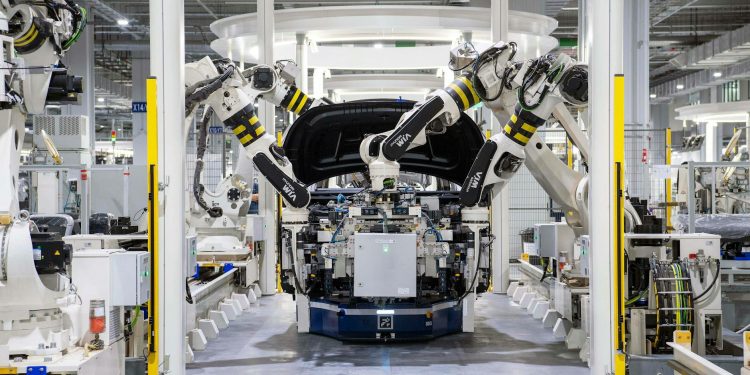Exploring Industry-Specific Tech Solutions
In our ever-evolving digital landscape, technology plays a pivotal role in shaping various industries. The integration of cutting-edge tech solutions has transformed traditional business models and revolutionized operations across multiple sectors. Let's delve into the profound impact of technology on different industries and underscore the significance of tailor-made tech solutions.
The Impact of Technology on Various Industries
Technology has become the cornerstone of modern business operations, driving innovative advancements and fostering growth across diverse sectors. From streamlining processes to enhancing customer experiences, tech solutions have redefined the way industries operate and interact with their stakeholders.
| Industry | Impact of Technology |
|---|---|
| Financial Institutions | Innovations in banking systems have streamlined transactions and improved customer service. Security enhancements and fraud prevention technologies have bolstered data protection. |
| Healthcare | Electronic Health Records (EHR) systems have digitized patient information, enabling seamless data access and management. Telemedicine and remote health monitoring have revolutionized healthcare delivery, especially in remote areas. |
| Manufacturing | Automation and robotics have optimized production processes, increasing efficiency and precision. Integration of Internet of Things (IoT) technologies has transformed factories into smart, interconnected ecosystems. |
| Retail | Omni-channel retailing has bridged online and offline shopping experiences, creating seamless customer journeys. Personalized customer experiences driven by data analytics have enhanced customer engagement and loyalty. |
| Logistics | Fleet management systems have optimized transportation routes, reducing costs and improving delivery times. Supply chain optimization technologies have enhanced visibility and efficiency throughout the logistics network. |
Importance of Tailored Tech Solutions
While the impact of technology is ubiquitous, the importance of customizing tech solutions to meet the specific needs of each industry cannot be overstated. Tailored tech solutions are designed to address the unique challenges and requirements of individual sectors, ensuring optimal performance and maximum value extraction.
Customized tech solutions empower businesses to leverage technology in a way that aligns with their operational objectives and strategic goals. By tailoring tech solutions to industry-specific demands, organizations can enhance productivity, streamline processes, and gain a competitive edge in their respective markets.
In a dynamic business landscape where agility and innovation are paramount, investing in industry-specific tech solutions is not just a strategic choice but a necessity for sustainable growth and resilience. By embracing tailored tech solutions, businesses can future-proof their operations and unlock new opportunities for success in an increasingly digital world.
Tech Solutions in Financial Institutions
In the realm of financial institutions, the adoption of industry-specific technology solutions plays a pivotal role in driving operational efficiency, enhancing customer experiences, and fortifying security measures. Let's delve into two key areas where technology innovations are reshaping the landscape of banking systems and safeguarding against potential threats through heightened security enhancements and fraud prevention.
Innovations in Banking Systems
The dynamism of technology has brought about a wave of innovations in banking systems, revolutionizing the way financial institutions operate and interact with their clients. From the emergence of mobile banking applications to the integration of AI-powered chatbots for customer service, these advancements have streamlined processes and empowered customers with convenient access to financial services.
One notable innovation in banking systems is the expansion of digital payment solutions, providing customers with a seamless and secure way to conduct transactions online or through mobile devices. The evolution of contactless payments, peer-to-peer transfers, and instant payment systems has ushered in a new era of speed and convenience in financial transactions.
Furthermore, the utilization of blockchain technology in banking systems has garnered attention for its potential to enhance transparency, reduce costs, and expedite cross-border transactions. By leveraging decentralized ledgers, financial institutions can mitigate risks associated with traditional banking processes and create more efficient systems for tracking and verifying transactions.
Security Enhancements and Fraud Prevention
As the digital landscape of financial services expands, so does the importance of implementing robust security measures to safeguard sensitive data and protect against fraudulent activities. Financial institutions are continuously investing in advanced security solutions to fortify their systems and shield customers from potential threats.
One key area of focus for security enhancements is the implementation of multi-factor authentication methods to verify user identities and prevent unauthorized access to accounts. By combining factors such as passwords, biometrics, and security tokens, institutions can bolster the security of online transactions and minimize the risk of identity theft.
In the fight against fraud, the adoption of AI and machine learning technologies has proven instrumental in detecting suspicious activities and patterns in real-time. Through the analysis of vast datasets and behavioral analytics, financial institutions can proactively identify and mitigate fraudulent behaviors, protecting both their assets and their customers.
By staying at the forefront of technology-driven innovations in banking systems and investing in cutting-edge security solutions, financial institutions can position themselves as leaders in providing secure, efficient, and customer-centric financial services. Embracing these advancements is essential in meeting the evolving needs of clients and adapting to the ever-changing landscape of the financial industry.
Tech Solutions in Healthcare
In the healthcare industry, the adoption of technology has revolutionized patient care, streamlined operations, and improved overall efficiency. Two key industry-specific tech solutions that have made a significant impact are Electronic Health Records (EHR) systems and Telemedicine with Remote Health Monitoring.
Electronic Health Records Systems
Electronic Health Records (EHR) systems have transformed the way patient information is captured, stored, and shared among healthcare professionals. These digital records provide a comprehensive view of a patient's medical history, including past diagnoses, medications, test results, and treatment plans. By moving away from paper-based records to EHR systems, healthcare providers can access real-time patient data, reduce errors, and enhance the coordination of care across different medical facilities. This leads to improved patient outcomes and increased operational efficiency.
| Benefits of EHR Systems |
|---|
| Improved accuracy and completeness of patient records |
| Enhanced communication and collaboration among healthcare teams |
| Streamlined workflows and reduced administrative burden |
| Better adherence to regulatory requirements and data security standards |
To learn more about the latest trends and innovations in EHR systems, check out our article on industry solutions trends.
Telemedicine and Remote Health Monitoring
Telemedicine and Remote Health Monitoring technologies have revolutionized the delivery of healthcare services, especially in remote or underserved areas. Telemedicine enables healthcare providers to conduct virtual consultations with patients through secure video conferencing platforms, allowing for diagnosis, treatment, and monitoring of various medical conditions from a distance. Remote Health Monitoring involves the use of wearable devices and sensors to collect real-time health data, enabling continuous monitoring of patients' vital signs and health parameters.
| Advantages of Telemedicine and Remote Health Monitoring |
|---|
| Increased access to healthcare services, particularly for rural or homebound patients |
| Reduced healthcare costs and travel time for both patients and providers |
| Early detection of health issues through continuous monitoring |
| Enhanced patient engagement and adherence to treatment plans |
For more information on how telemedicine is reshaping the healthcare landscape, visit our article on industry solutions and challenges.
By leveraging Electronic Health Records systems and Telemedicine with Remote Health Monitoring technologies, healthcare institutions can enhance patient care, optimize processes, and drive innovation in the ever-evolving healthcare industry. Our commitment to providing industry-specific technology solutions underscores our dedication to improving healthcare outcomes and advancing the delivery of quality care.
Tech Solutions in Manufacturing
In the manufacturing sector, the adoption of technology-driven solutions has revolutionized operations, enhancing efficiency, productivity, and agility. Two prominent tech solutions making waves in the manufacturing industry are automation and robotics, along with IoT integration for smart factories.
Automation and Robotics
Automation and robotics have significantly transformed the landscape of manufacturing by streamlining processes and reducing manual labor. By leveraging automated systems and robotic technologies, manufacturers can achieve higher precision, consistency, and speed in production.
One of the key benefits of automation in manufacturing is the ability to optimize workflows and reduce operational costs. Robotic arms and machines can perform intricate tasks with great accuracy, leading to improved quality control and reduced human error. This results in enhanced productivity and faster turnaround times, allowing manufacturers to meet increasing market demands efficiently.
| Metric | Manual Operation | Automated Operation |
|---|---|---|
| Production Efficiency | 60% | 90% |
| Error Rate | 5% | 0.5% |
| Labor Costs | High | Reduced |
IoT Integration for Smart Factories
The integration of IoT (Internet of Things) technology in manufacturing has ushered in the era of smart factories, where interconnected devices and systems communicate and collaborate in real-time. IoT sensors embedded in equipment and machinery collect valuable data that can be analyzed to optimize processes and improve decision-making.
Smart factories enabled by IoT offer manufacturers greater visibility and control over their operations. By monitoring equipment performance, tracking inventory levels, and analyzing production data, manufacturers can identify inefficiencies and make data-driven decisions to enhance overall efficiency and sustainability.
| Metric | Traditional Factory | Smart Factory with IoT |
|---|---|---|
| Equipment Downtime | Unplanned | Predictive Maintenance |
| Inventory Management | Manual | Automated Tracking |
| Energy Consumption | Standard | Optimized Usage |
By embracing automation, robotics, and IoT integration, manufacturers can drive innovation, improve productivity, and remain competitive in today's fast-paced and dynamic market. These industry-specific technology solutions pave the way for a more efficient, sustainable, and interconnected future for the manufacturing sector.
Tech Solutions in Retail
In the realm of retail, the adoption of industry-specific technology solutions has become paramount to stay competitive in the ever-evolving market. Two key tech solutions that have transformed the retail landscape are omni-channel retailing and providing personalized customer experiences.
Omni-Channel Retailing
Omni-channel retailing is not just a trend, but a vital strategy for retailers looking to create a seamless shopping experience for customers across various touchpoints. By integrating multiple channels such as physical stores, online platforms, mobile apps, and social media, retailers can offer customers the flexibility to engage with their brand in a cohesive manner.
This approach allows customers to transition effortlessly from one channel to another while maintaining a consistent experience. For example, a customer might start browsing products on a mobile app, then visit a physical store to try them on, and finally make the purchase online. Retailers that excel in omni-channel retailing can leverage data analytics to track customer behavior and preferences, leading to more targeted marketing efforts and increased sales.
| Channel | Retailers |
|---|---|
| Physical Stores | 90% |
| Online Platforms | 85% |
| Mobile Apps | 70% |
| Social Media | 60% |
Personalized Customer Experiences
In today's competitive retail landscape, offering personalized customer experiences has become a key differentiator for brands. By leveraging data analytics and artificial intelligence, retailers can gather insights into customer preferences, purchase history, and demographics to tailor offerings and recommendations to individual shoppers.
Personalization goes beyond just addressing customers by their first name; it involves creating unique shopping experiences based on past interactions. For instance, retailers can send targeted promotions, product recommendations, and personalized discounts to customers, increasing engagement and driving loyalty.
| Personalization Tactics | Effectiveness |
|---|---|
| Targeted Promotions | High |
| Product Recommendations | Medium |
| Personalized Discounts | High |
| Customized Services | Medium |
By embracing omni-channel retailing and focusing on personalized customer experiences, retailers can adapt to changing consumer behaviors and preferences, ultimately leading to enhanced customer satisfaction, loyalty, and increased revenue. These industry-specific technology solutions are reshaping the retail landscape, opening up new opportunities for growth and innovation in the retail sector.
Tech Solutions in Logistics
When it comes to the logistics industry, embracing tailored tech solutions is essential for enhancing operational efficiency and streamlining processes. In this section, we will delve into two key technological advancements that have revolutionized the logistics sector: fleet management systems and supply chain optimization technologies.
Fleet Management Systems
Fleet management systems play a pivotal role in the logistics industry by providing companies with real-time visibility into their fleet operations. These systems leverage GPS tracking and telematics technology to monitor vehicle locations, routes, and performance metrics. By harnessing data analytics, companies can optimize fleet utilization, reduce fuel consumption, and enhance driver safety.
One of the primary benefits of fleet management systems is the ability to improve operational decision-making. By analyzing data on vehicle health, driver behavior, and route efficiency, companies can identify areas for improvement and implement strategies to enhance overall productivity. Additionally, these systems facilitate proactive maintenance scheduling, which helps prevent unexpected downtime and prolong the lifespan of fleet assets.
| Metric | Improvement |
|---|---|
| Fuel Efficiency | Up to 15% |
| Maintenance Costs | Up to 20% |
| Vehicle Utilization | Up to 10% |
To learn more about how fleet management systems can transform logistics operations, explore our article on industry-specific solutions in logistics.
Supply Chain Optimization Technologies
Supply chain optimization technologies are instrumental in helping logistics companies streamline their supply chain processes and enhance overall efficiency. These technologies leverage advanced algorithms and predictive analytics to optimize inventory management, reduce lead times, and minimize costs throughout the supply chain network.
By integrating supply chain optimization technologies, companies can achieve greater visibility and transparency across their supply chain, enabling them to make data-driven decisions and respond rapidly to changing market dynamics. These technologies also facilitate collaboration and communication among different stakeholders, fostering strong relationships and driving operational excellence.
| Metric | Enhancement |
|---|---|
| Lead Time Reduction | Up to 30% |
| Inventory Accuracy | Up to 98% |
| Cost Savings | Up to 25% |
For insights on the latest trends and innovations in supply chain optimization technologies, explore our article on innovative industry solutions for logistics.
By leveraging fleet management systems and supply chain optimization technologies, logistics companies can achieve greater operational efficiency, cost savings, and customer satisfaction. These industry-specific tech solutions are instrumental in driving transformation and success in the logistics sector, paving the way for a more connected and agile supply chain ecosystem.










